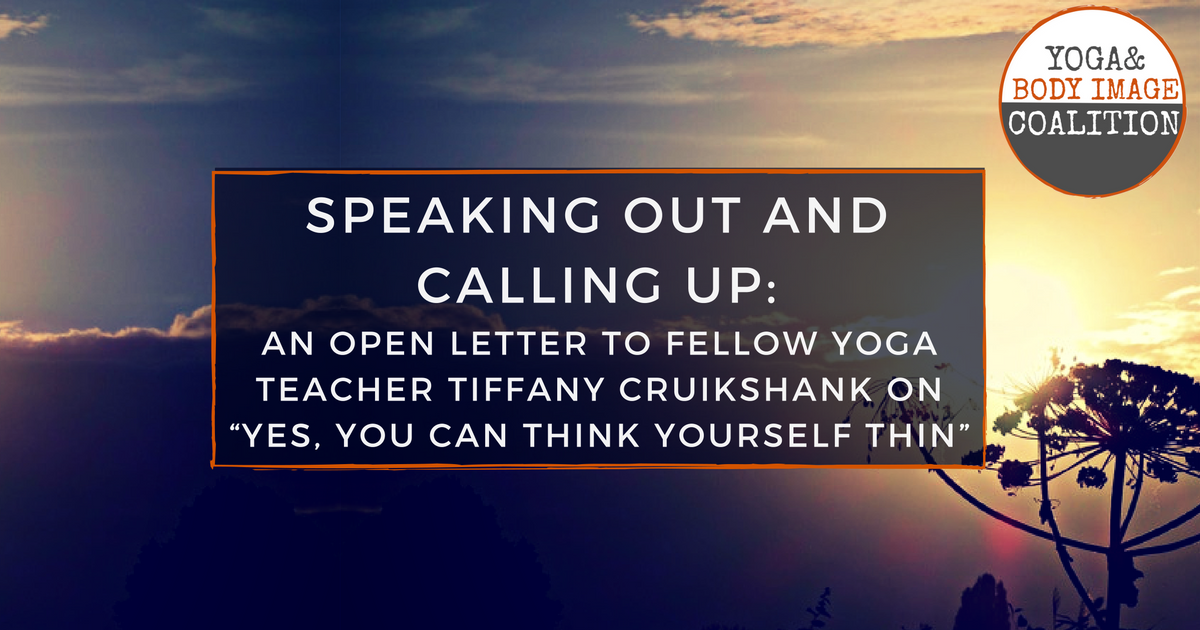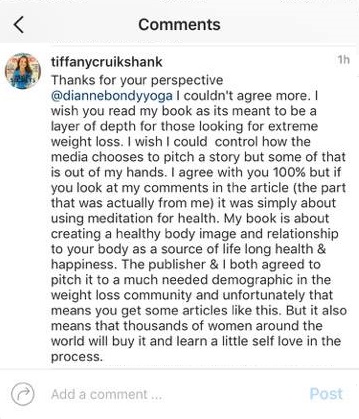Speaking Out and Calling Up Part One: An Open Letter To Fellow Yoga Teacher Tiffany Cruikshank on “Yes, You CAN Think Yourself Thin
September 12, 2016
NOTE: Since this open letter was published, the article referenced has been removed from Tiffany Cruikshank’s Yoga Medicine website; however, the article which includes images that further highlight the contradiction of meditation being used to perpetuate the “Thin Ideal”, is still live at the Daily Mail UK.
Dear Tiffany Cruikshank,
Your article “Yes You CAN Think Yourself Thin: From resisting that biscuit to learning to love the gym, a life-changing book reveals the new way to hit your perfect weight” not only saddened and disheartened me but, as an eating disorder survivor, deeply triggered me.
As a yoga teacher I was angry and frustrated to see yet another teacher, a colleague of mine, profiting off of the “Thin Ideal” perpetuated in our society; the same ideal that I see so many of my students compelled to strive for. As I read on, I noticed the thin = happy and healthy theme that the diet industry utilizes to prey on people’s insecurities. In this article, you claim that meditation “is the queen of all good weight-loss habits.” I most definitely was not taught this in my 200 and 500 hour yoga training programs. I resonate more with this definition of meditation by Pia Guerrero, founder of Adios Barbie, “The true nature of meditation (and yoga) is for one to develop an experience of wholeness, compassion, love, patience, generosity and forgiveness.” From your article one would believe that you see mediation as a weight loss tool, and a slim body the key to happiness.
I am curious, which definition of meditation resonates most with you?
 In the “Meditate To Watch Weight” section of your article, key points are highlighted such as: “Picture yourself slimmer – going through every aspect of a full day. Really visualize all the detail and make a point of noticing everything that feels different…Then turn your mind towards creating this image of yourself at a healthy weight. What does it feel like? …Can you picture yourself slim? What do you look like? How does it feel? Try to notice all of the sensations in this new, healthy body.”
In the “Meditate To Watch Weight” section of your article, key points are highlighted such as: “Picture yourself slimmer – going through every aspect of a full day. Really visualize all the detail and make a point of noticing everything that feels different…Then turn your mind towards creating this image of yourself at a healthy weight. What does it feel like? …Can you picture yourself slim? What do you look like? How does it feel? Try to notice all of the sensations in this new, healthy body.”
Based on all of the above, it would be easy for me to assume the  worst, that you are simply preying on people’s lack of self-love, self-worth, and false belief in the “Thin Ideal” to make a profit. However, I have read social media comments from you in your exchanges with Dianne Bondyand passages from your book, that make me think differently; that you do not see the disconnect with what you are stating in your articles (which are all listed as either written by or endorsed by you), and how you are promoting “Meditate Your Weight” as a weight-loss book. It appears you acknowledged early on that your book was written to represent meditation as a weight-loss tool based on a review you have on your website by Well and Good. This review states: “We generally skip weight-loss books, but this one is super interesting for its unique approach to the topic”. In comments on Dianne Bondy Yoga’s Instagram page, you say you want to provide people with tools for a positive body image,…“My book is about creating a healthy body image and relationship to your body as a source of life long health & happiness…”
worst, that you are simply preying on people’s lack of self-love, self-worth, and false belief in the “Thin Ideal” to make a profit. However, I have read social media comments from you in your exchanges with Dianne Bondyand passages from your book, that make me think differently; that you do not see the disconnect with what you are stating in your articles (which are all listed as either written by or endorsed by you), and how you are promoting “Meditate Your Weight” as a weight-loss book. It appears you acknowledged early on that your book was written to represent meditation as a weight-loss tool based on a review you have on your website by Well and Good. This review states: “We generally skip weight-loss books, but this one is super interesting for its unique approach to the topic”. In comments on Dianne Bondy Yoga’s Instagram page, you say you want to provide people with tools for a positive body image,…“My book is about creating a healthy body image and relationship to your body as a source of life long health & happiness…”
When I read that I think YES, yoga and meditation can be used for exactly this! In fact that is what myself, Dianne, and the other members of The Yoga and Body Image Coalition are working for too. You are openly targeting and marketing to people who are struggling with body image issues and self-acceptance. Which would be fine if you were marketing your book just as that, “Meditate your Self-Acceptance” vs “Mediate Your Weight”.
just as that, “Meditate your Self-Acceptance” vs “Mediate Your Weight”.
There is a disconnect and contradiction in your message. You cannot be body positive and support diet culture at the same time.2 The two are mutually exclusive. Diet culture and the diet industry are not body positive, no matter what spin is put on it or how much justification is given as a means to a self-loving end. Being body positive, embracing health at every size, and believing in self-love as a path to health means you stand up and stand against the diet culture and diet industry every step of the way. As Pia Guerrero states, “Dieting cultivates a deep sense of lack and rejection of how one is right here, right now—the antithesis of any meditation practice.”
The intention of this letter is to call you up, not out. In doing so, the YBIC and I are calling you into embracing and taking on a true leadership role in the Body Positive Movement where you never compromise the movement for profit. As a public role model and founder of “Yoga Medicine”, you have the power to influence others, your words matter. And if you make a misstep, as we all do at some point, you acknowledge it, learn from it and do better next time.
As an Eating Disorder Advocate and someone in recovery, I feel compelled to address the impact that the message of your article also has on people who suffer from or are in recovery from an eating disorder (ED). I was personally  triggered by the “Yes, You CAN Think Yourself Thin” article. Yoga and meditation are powerful and effective tools of healing as an integral component of my own recovery as well as many others. Your article turns meditation into a potential weapon to be used against those suffering from an eating disorder, disordered eating and/or body dysmorphia as opposed to an ally in healing. Those who have experienced an eating disorder, know someone affected by an ED, or are an eating disorder recovery professional would agree that some of the information shared in this article is triggering and potentially harmful to someone in recovery. The president of The Association for Size Diversity and Health, Carmen Cool, MA, LPC, sums up this point in stating “Of all the benefits of meditation, let’s leave our bodies out of it. We can do better. We must do better if we want to live in a world where people can live peacefully inside of – and in the world with – their bodies as they are. Let’s use our practices to bolster us to work for a weight inclusive world.”
triggered by the “Yes, You CAN Think Yourself Thin” article. Yoga and meditation are powerful and effective tools of healing as an integral component of my own recovery as well as many others. Your article turns meditation into a potential weapon to be used against those suffering from an eating disorder, disordered eating and/or body dysmorphia as opposed to an ally in healing. Those who have experienced an eating disorder, know someone affected by an ED, or are an eating disorder recovery professional would agree that some of the information shared in this article is triggering and potentially harmful to someone in recovery. The president of The Association for Size Diversity and Health, Carmen Cool, MA, LPC, sums up this point in stating “Of all the benefits of meditation, let’s leave our bodies out of it. We can do better. We must do better if we want to live in a world where people can live peacefully inside of – and in the world with – their bodies as they are. Let’s use our practices to bolster us to work for a weight inclusive world.”
You see, people who suffer from an eating disorder have a difficult time differentiating between healthy and harmful thoughts. When someone is deep in their disorder it is often the voice of the eating disorder that speaks the loudest and the one that is followed the most. Eating Disorders love to find ways to convince you that you are making a healthy choice, when in reality (and obvious to people without an ED) that choice is damaging to your health.
Eating Disorders are so damaging to the health of the sufferer that it has the highest mortality rate of any mental illness. So when a yoga teacher, someone who considers themselves a “health expert,” and teaches “yoga as medicine” tells you that they have a way that you can become a slimmer, sexier, happier person, you pay attention. And when part of that solution is to “resist that biscuit and learn to love the gym” well, the ED loves that even more. “See,” says the eating disorder, “it’s healthy”. “I’m being healthy”….when all the while that meditation that helped you resist that biscuit and go to the gym, also helped you resist breakfast, lunch and dinner. That is when this advice goes from irresponsible to potentially deadly. What I have discovered through the process of writing this post, (which entailed connecting with other yoga teachers, as well as people in the eating disorder recovery community) is that there is a great need for more education to be provided to yoga teachers with regard to eating disorders and eating disorder recovery. This is not something you are alone in needing education in. Jenny Copeland, PsyD, RYT200 offered this insight, “We are limited only by our capacity to be open, our willingness to see  what we have been ignorant of for so long. So ask the question, anticipate how one action leads to the next, and shine the light on all that yoga has to offer to all bodies, just as they are.”
what we have been ignorant of for so long. So ask the question, anticipate how one action leads to the next, and shine the light on all that yoga has to offer to all bodies, just as they are.”
Tiffany, I said before that I was asking you to do better. I think that is something that we all can take to heart. I am grateful that the platform provided by the Yoga and Body Image Coalition exists so we as a yoga community can continue to engage in much needed conversations; to learn and grow together as teachers and practitioners. As Maya Angelou says “Do the best you can until you know better. Then when you know better, do better.” Let’s all hold each other accountable to know and do better.
In solidarity,
Nikki Cook
 Nikki is a member of the Yoga and Body Image Coalition. She is a 200 hour registered yoga teacher, 300 hour certified children’s yoga teacher, Unnata certified aerial yoga teacher and has a 500 hour certification in therapeutic yoga. Through her teaching and work with the Yoga and Body Image Coalition, Nikki advocates for advancements in the diagnosis and treatment of eating disorders, including the use of yoga and meditation as an integral part of recovery from eating disorders, disordered eating and body dysmorphia. You can visit Nikki online atnikkicookyoga.com or get in touch via email: nikkicookyoga@gmail.com
Nikki is a member of the Yoga and Body Image Coalition. She is a 200 hour registered yoga teacher, 300 hour certified children’s yoga teacher, Unnata certified aerial yoga teacher and has a 500 hour certification in therapeutic yoga. Through her teaching and work with the Yoga and Body Image Coalition, Nikki advocates for advancements in the diagnosis and treatment of eating disorders, including the use of yoga and meditation as an integral part of recovery from eating disorders, disordered eating and body dysmorphia. You can visit Nikki online atnikkicookyoga.com or get in touch via email: nikkicookyoga@gmail.com

Bravo! So well articulated there is nothing I could say here to contribute more. I think I will go have a biscuit and tonight during my meditation I will envision going through my day with love and light, for myself and for all others.
I am sitting here in Los Angeles. Watching lots of zero body fat people carrying yoga mats scuffling to and fro. I am eating some potato chips. ( home made) with chili and lime. I am even having an IPA . Ok. I see this I am touched by your bravery. Thank you. The song playing here at Tendergreens is Livin My Life Like Its Golden . I think if you are not embracing this amazing speck in time and feeling grateful, abundant and Beautiful something is deeply wrong. Love your body. Know balance. Remain honest, and enjoy the bounty of wealth and luck. People are funny looking… Enjoy!
Thank you Lesa! And I love that you are envisioning love and light for yourself and others!
True sanga, true tribes, true communities, hold their members accountable. I hope that Tiffany and other members the so-called yoga community are willing to overcome the initial discomfort of accountability feedback. Leaning into the edge of that discomfort and making it through to the other side creates such expansion and growth: two main reasons to have a yoga practice in the first place.
I completely agree with you Simone. We need to hold each other accountable. Thank you for your support.
Yes! Love this so much!
Thank you Stephanie!!
Well done! Xx
Thank you Kylie! I appreciate your support.
You all can gripe all you want to, but thin people are healthier then fat people in most cases. I say in most cases. There are always exceptions as with eating disorders or other illnesses. Just because you are triggered does not mean Tiffany is out to get fat people, shes just trying to help someone lose weight if they want to.
Hi Patricia, I have replied to your comments on other posts but wanted to do so here as well. First of all, I encourage you to research Health at Every Size. I think it will provide you will further information on why the statement that thin people are healthier than fat people is incorrect. Second, the point in me pointing out that I was triggered was to educate Tiffany, and other yoga instructors, on the importance of the use of language in our teachings. We are responsible when we trigger someone in our class and need to learn from that to prevent it from happening in the future. Finally, I never said Tiffany was out to get fat people. This was about how we, as yoga teachers, choose to market our offerings. Thank you for taking the time to comment and to follow the work of YBIC.
Very well done. Thank you for supporting me just as I am.
And your evidence of this? Your expertise on this issue? This is not the point of this article in many ways but the most current science disagrees with you.
Thank you for supporting me and YBIC Terri!
Nikki, I wish I could have a conversation with you about this article because it brings up SO many questions for me. Many of these questions started in Diane’s session at YSC and your article brings them back to mind. I know I am not the only person with these questions. I hope to gain some understanding of the nature of the body positive movement.
I do not know Tiffany or her work. I’m hearing about her book here for the first time, so I can neither defend or agree with your assessment of her work in particular. However, you bring up many high level topics that I seek clarity on.
In regards to diet culture; where do you draw the line between healthy diets (like the ones proposed in Ayurveda), yogic cleansing and the awful diet industry that preys on insecurity and thin ideal. How did you come to determine that Tiffany’s work is on the wrong side of that line?
As a person struggling right now to release extra weight, I am not phased, offended or surprised to find a yoga teacher offering visualization as a tool for weight loss. I can both accept my self and body as it is AND work to lose pounds because I am healthier that way. I’m hearing a message that it’s somehow not okay to desirer work to lose weight.
There are so very many negative, life-debilitating weight loss approaches. It seems to me that utilizing meditation as part of a healthy weight loss program is very positive. People use visualization to empower so many aspects of life (birth, overcoming fears, healing). I fail to see how meditation for weight health is a bad thing.
I hear you saying that there is a chance people with eating disorders could use these techniques negatively. Isn’t that the case for every aspect of yoga? Asana and pranayama can both be used unconsciously (or consciously) in ways that negatively affect certain people. I think we all have to take personal responsibility for the practices we choose. Because a practice doesn’t fit you doesn’t make it a bad practice. (obvi)
I’m not understanding how “skipping a biscuit” is connected to (negative) diet culture. I’ve skipped biscuits for nearly 10 years bc of the gluten. They literally hurt my body. If someone else chooses to skip a biscuit because they want to lose weight for health reasons, why is that bad? Ayurveda gives us SO many foods to skip! For health. How is this biscuit skipping any different? Because it’s directly related to weight loss? You know that people have major issues with food. I just don’t understand the negative reaction to using the powerful practices of yoga to meet the challenges of creating a healthy diet. What am I missing?
What is the difference between fat shaming and thin shaming? Does weight inclusive “include” people who want to lose weight for health?
Is body positive only for people who do not want to change anything about their body? IS it possible to be body positive AND working to create a healthier body (which may include weight loss)?
I am asking these questions with utmost sincerity. I’ve tried to put my own triggered feelings about the nature of your letter aside until right now. As I said, I don’t know Tiffany. You may be right about her motivations. I have no way of knowing that. And while I do agree there is a time to call people up, I think its critical to know for sure the whole of a persons motive if we are going to publicly denounce their work. I am unclear on what you are actually asking Tiffany to do. How do you suggest she “do better?”
Any light you can shed is greatly appreciated.
I totally agree with you.
[…] Yoga and Body Image Coalition website an has been republished with permission. Photo credit: Sarit Z. Rogers, courtesy of […]
Interesting… But no amount of meditation will change a kapha type body into a vata one – NO amount of meditation… But it will promote the sense of self that is accepting and loving of the innate nature one possesses. One size does not fit all – our essential uniqueness is to be accepted while we cultivate healthy ways to be our best self.
I wholeheartedly agree Laurie. Thank you for sharing your perspective!
I’m feeling a bit confused and saddened by this recent firestorm regarding this topic. As someone who has a larger body, who believes wholeheartedly in body acceptance and body positivity, I feel that the anger aimed at Tiffany Cruikshank goes against everything I belive.
I have family history of heart disease and diabetes. Recently my numbers are not what they should be. And as someone who has loved ones who have suffered from EDs, I know the tragic repercussions from that disease as well. So while I understand the implications of being triggered, does this mean I should not be allowed access to the information Tiffany has to offer? Which to me is very similar to Thich Nhat Hanh’s in his book “Savor”. And isn’t mindfulness better than trotting off to Jenny Craig or Weight Watchers?
I thought that the YBI Coalition was somewhere I belonged, but this recent negativity has me seriously questioning that. I believe you’re throwing the baby out with the bathwater.
“I believe you’re throwing the baby out with the bathwater.” This is exactly what I am seeing, as well. Thank you for articulating.
Kathy, thank you for your response. I hope that my further clarification I posted below will help you to see that I was in no way directing anger at Tiffany. This was about addressing the responsibility of yoga teachers to not perpetuate the Thin Ideal in our society as well as to educate on the triggering aspects of the langauging being used in the article. Thank you for being part of YBIC. We hope you continue to follow our work and engage in discussion!
Yes! THANK you.. The entire article by TC reflects a deeper layer of oppression of the lunar/feminine in both females and males or which ever gender one identifies with. It is the parasitic monster that shows up as only recognizing the ‘young skinny’, denies emotion, keeps the feminine ‘starving’. A starving woman cannot access her own power, her own Eros and sexuality, and she stays in the shadow of self hate unworthiness and lack. It is the same energy that denies the lunar energy in the masculine shaming men for emotion, sexual drive and their lunar qualities which is deemed as ‘effeminate’ or weak. This mindset is absolutely intricately woven into the same energy that dismisses and violates our planet. THANK You for being a voice and speaking to this. Unfortunately the yoga culture has been taken over by the parasitic organism that feeds on this paradigm of unworthiness and ‘not “fill in the blank” enough.’ I do however believ there is a growing awareness and modalities of healing and transformation that are true pathways for integrating and experiencing inner wholeness. Love Your Body. ❤️
I echo many of the comments here that question why you are challenge Tiffany on her book. And I wonder, have you actually read it? It seems to me that you are more upset with the press behind the book, and have more frustration with this article that wrote about it, than the book itself. I own Mediatae Your Weight and after reading the first few chapters, have not picked up on any of the issues you address here.
I think the body positive movement is so afraid of people wanting to lose weight. I complete agree with the comment above that you can love your body and still want to lose weight. I think you’ve missed the mark on this one.
It saddens me to read this. I agree with a lot of your perspectives so I can’t help but feel like you don’t really know much about me or my book.
First off, I want to note that the “think yourself thin” comment had nothing to do with me or my PR company, what I was trying to say in my comment on Instagram was that when you give an interview you have no control over how the outlet writes it or the title they use. In this case it was the writer/outlet that chose that wording and I agree, I cringed when it came out, but I have to let that go as I have no control over what every person says and they clearly wanted to catch people’s attention as most media does, which is a bigger conversation…
Secondly, I want to note that my book is not advertised or stated as a book for eating disorders. As a healthcare provider I see many patients who come in looking to lose weight whether it’s to feel better or for health reasons. There’s clearly a point at which the body can be so over or under weight that it becomes a serious health problem. Either way there’s a very large demographic of people looking for answers and struggling with their bodies, their health, and their self-concept. I’m so grateful that there are so many communities like yours out there that are bringing awareness to the topic of body image. But I also feel there’s a huge demographic of people who are searching for answers and turning to extreme weight-loss and other diet books, creating a self-perpetuating cycle. I really wanted my book to be helpful to these people who are relying on other materials that only make this cycle worse. If you read my book all the way through, what you find is that it uses mindfulness and meditation to create healthy eating habits and healthy weight loss (which is clearly left up to the individual to decide what that is) but it more importantly it addresses a healthy relationship with our body and our self-concept not just what society tells us we should look like.
My approach is and has always been to help my students and patients let go of what they think they need to do or look like in order to learn to embody true health as an experience of living in their skin and listening to their bodies. This is also what I spend so much of my time teaching with Yoga Medicine. I do not believe there is one single way for every person. This book was clearly not made for people with eating disorders but for people looking for options. It is meant to give people a long-term solution to not only their health but their relationship with their body and themselves. My goal was not to serve the diet industry but to shine some light and mindfulness on an underserved demographic (or better yet a poorly served demographic).
As many people in the yoga and meditation community have experienced, a majority of people begin a yoga practice to get healthy or lose weight and quickly find there is something deeper beneath it. But what if we told everyone that it was bad to start for those reasons and shamed them out of even trying. Think of all the people who would not be practicing. I don’t know about you, but I’m so glad they gave the practice a chance. The same is true with my book. While some may be turning the first page hoping for an answer to a struggle with their weight, I know they will find something deeper. At the end of the day I believe my book has and will continue to help many, many people out there and that’s what matters most to me. There is not a single book out there that is good for every single person and I’m ok with that. I do not wish to harm anyone and I apologize if you took offense at it. I wish you all the best in your journey that this life brings you. In the end I believe we are all the same, we all struggle in our own way and we all fight our own battles but in the end we are all one and rather than fight we need to support each other in our differences, in our uniqueness and in our strengths.
These are difficult conversations indeed. The fact that we share and discuss these ideas is (almost) as important as the outcome of the debate. It is vital we ask these questions of ourselves and each other. Although each of our ideas are individually important, the new understandings we create together have the greatest potential. With that being said…
As a psychologist specializing in the treatment of eating disorders, I devote my days to facing the consequences of diet culture. In our current culture young girls would rather be hit by a bus than be fat. Eating disorders are the deadliest mental illness. And though we may have good treatment options and there is always hope, there is no perfect cure to these illnesses. Many will not survive. Changing the tides requires not only speaking directly to those who suffer from an eating disorder in the present moment. It requires we take responsibility for our actions. That we change the conversation profoundly.
This is not only about your book. This is not only about your work. It is about the greater culture. A culture which values certain people, certain bodies, over others. We cannot strive for diets that are simply less terrible than the Biggest Loser. Mindfulness and meditation are certainly more kind than the proven harm which comes from extreme dieting. Yet ultimately, this is only a repackaging of the same concept. Just consider what could occur if we honor the heart of these practices, their truest nature. When we teach those around us to not just treat their bodies with less hate, but to cultivate true compassion.
Yoga studios are filled with students who initially step foot in the classroom searching for a new and engaging workout, seeking weight loss and a specific body shape. As their teachers, yes of course we meet them here. More importantly, it is our job to serve them well in the long run: to not feed the monologue in their head spinning tales of body hatred. Serving these folks does not require the improved diet schemes you detail. We are of service by helping them see the diet is not necessary in the first place. We help them see and follow a better path, where weight loss is not the end point.
As yogis we are uniquely equipped with knowledge and practices to alter this culture. It is not enough to teach people to love their bodies. We must help create a culture where it is safe to do so. A culture where people strive to nourish their bodies and souls. A culture which makes it difficult for an eating disorder to thrive and grow.
We cannot afford to simply create a better diet. Not while people are dying.
First of all, I want to thank you for your response. I got the sense that reading and reflecting on my post was difficult and I would like to acknowledge your willingness to engage in this discussion. Being open to hearing other’s ideas, thoughts, and lived experiences is crucial to our growth and development on both an individual and collective level.
You said that you feel I do not know much about you or your book. I want to tell you that I do know of your work and that I agree with many of the things you have said regarding the benefits of yoga/meditation; including what I read in your book. Honestly, this made it all the more important for me to write the blog post. I felt responsibility to not only highlight the disconnect between your stated intention of the book with the advertising you supported, but to speak out for those who were, and will continue to be, negatively impacted by this article.
You have many followers and with that comes great responsibility. I strongly believe that it is our responsibility as yoga teachers, health and wellness professionals to hold ourselves and each other accountable for what we say; whether that be in a class, article, book, or video. We know that people trust us and take any advice we give them to heart. We need to be thoughtful and mindful of what and how we say things. This includes what was said in the article “Yes You Can Think Yourself Thin”. I understand that when one is interviewed they sometimes end up having little control over what and how things are said in the final piece. However, if you “cringed” when the Daily Mail article (http://www.dailymail.co.uk/femail/article-3751871/Yes-think-life-changing-new-book-reveals-new-way-hit-perfect-weight.html) came out why did you choose to put it on your website a day later? It seems to me that if you are putting this on your website then you are aligning yourself with everything that was written. You had a choice to distance yourself from something that did not align with the intention behind your book and your work, instead you chose to put it on your website. While you did not mention this in your response here, nor anywhere else to my knowledge, you have removed the “Yes You CAN Think Yourself Thin” article from your website. This tells me that you also see the disconnect with what was portrayed in that article and what you believe the true purpose of yoga and meditation to be, the one that you write about in your book. I think it would be powerful for you, as well as your followers, to step up and acknowledge the misstep in aligning yourself and your work with this article.
You said your book clearly was not made for people with eating disorders nor was it advertised as such. I agree, I have not seen that nor did I suggest you had marketed it in that manner. What I felt important for you, as well as other yoga teachers, to know is that so much of the languaging that was used in that article, as well as the suggested meditation, was extremely triggering for those affected by an eating disorder, disordered eating, and/or body dysmorphia. In the U.S. alone 20 million women and 10 million men will suffer from a clinically significant eating disorder at some time in their life. Given those numbers, I think it is fair to say that some of your readers will have an eating disorder or disordered eating. Whether one is specifically marketing to people affected by an eating disorder or not, it is important to acknowledge that people affected by eating disorders are currently in our classes, reading our books and watching our videos. I do not think that you, or any of us, can absolve ourselves of the responsibility of not only acknowledging when our words or actions have triggered someone but to also take it a step further; to learn from it and make the necessary changes to our behavior. Our words matter, what we say and how we say it matters. Sometimes we get so caught up in our good intentions that we cannot give space to recognize that our intentions did not align with our impact. When we do take give space for that realization, we also make space for growth.
Regarding your statement “As many people in the yoga and meditation community have experienced, a majority of people begin a yoga practice to get healthy or lose weight and quickly find there is something deeper beneath it. But what if we told everyone that it was bad to start for those reasons and shamed them out of even trying”
This I do not disagree with and nowhere in my post did I state that I thought people should not incorporate yoga as part of their health and wellness plan. For some people is weight loss part of that plan? Yes. However, I highly doubt that weight loss is the sole component of anyone’s health and wellness plan. I’m sure if we take the time to talk to our students we will find that weight loss is only one among many goals they have regarding their physical and emotional health.
What I and YBIC are asking is for all of us to bring a critical eye to which benefits of yoga we choose to highlight when we are marketing our offerings.
To take responsibility for how yoga is portrayed in the media and be aware of the effects that our choice of imagery and language have on our students. What I have seen, in reaction to my letter, is a large part of the yoga community come out in support of not using the thin ideal to sell yoga. To not perpetuate the idea (which is rooted in the diet industry) that a slim/thin body is a necessary component of a happy and healthy life. No one is saying that is not okay or in some cases necessary to lose weight. That, however, is unique to the individual. The sister science of yoga, Ayurveda, teaches us that and as yoga teachers we know this. So why then are some of us choosing to focus on weight loss, which may not even be appropriate for many of our students, as the primary selling point to engage more people in a yoga and meditation practice? We, as a professional community, need to continue (or in some cases step up and start) having discussions about what it means to be body positive. Acknowledge that our language, the words we use, matter. That it matters if we say or do something that triggers a student of ours. That we need to hold each other accountable. Which means when you see a fellow teacher stumble, you step up and say something. When you are the teacher who is spoken to, called up to be at inquiry…you do the hard work of self-study. And when that self-study reveals a misstep, you acknowledge it, you learn and grow from it. That is being in integrity, in alignment with your intentions and yogic principles. I expect this of myself, my teachers, and my colleagues. We all can do better!
Such a necessary conversation. Thank you for calling yoga teachers up. We all could learn from this experience to do better.
I wholeheartedly agree Natalie. This is a conversation all yoga teachers need to be having!